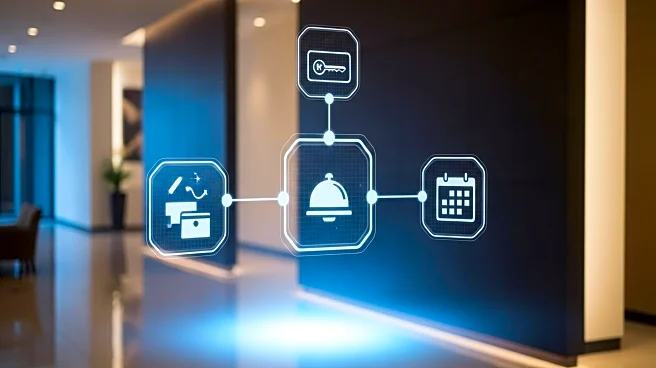What is the story about?
What's Happening?
Shiji Group, a global technology company, has partnered with Sudima Hotels to implement a unified technology stack aimed at improving operational efficiency and guest experience in the hospitality sector. The collaboration involved the integration of Shiji's cloud-based solutions, including Daylight PMS for centralized hotel management, Astral Payments for secure payment processing, and Stellaris Digital Payby for PCI-compliant payment collection. This initiative was designed to replace legacy systems that were prone to lag and downtime, particularly during peak periods, which negatively impacted check-in efficiency and guest satisfaction. The new system has resulted in significant improvements, such as reduced reservation errors, elimination of duplicate bookings, and faster check-ins through secure pre-arrival payment links.
Why It's Important?
The shift from legacy systems to a unified technology platform is crucial for the hospitality industry, which increasingly demands seamless and secure guest experiences. By adopting Shiji's integrated solutions, Sudima Hotels has not only enhanced operational efficiency but also strengthened compliance with modern security standards. This transformation allows hotel staff to focus more on guest services rather than manual administrative tasks, thereby improving overall guest satisfaction. The move also positions Sudima Hotels to better handle high-occupancy periods with minimal downtime, ensuring a more reliable and consistent service. This development highlights the growing trend in the hospitality industry towards digital transformation to meet evolving consumer expectations and operational challenges.
What's Next?
As the hospitality industry continues to evolve, more hotel chains may follow Sudima Hotels' lead in adopting integrated technology solutions to enhance their operations. The success of this initiative could prompt other players in the industry to invest in similar technology upgrades to remain competitive. Additionally, the focus on compliance and security in payment processing is likely to become a standard expectation, pushing more hotels to adopt tokenized and automated payment systems. The ongoing digital transformation in hospitality may also lead to further innovations in guest engagement and service delivery, as hotels seek to differentiate themselves in a competitive market.
Beyond the Headlines
The implementation of a unified technology stack in the hospitality industry not only addresses operational inefficiencies but also raises important considerations regarding data privacy and security. As hotels collect and process more guest data, ensuring compliance with data protection regulations becomes increasingly critical. The move towards automated and tokenized payment systems reflects a broader industry shift towards prioritizing data security and minimizing risks associated with data breaches. This development also underscores the importance of continuous staff training and adaptation to new technologies to fully leverage the benefits of digital transformation.


















